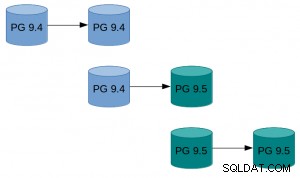Une autre approche serait -
SELECT housing_id
FROM mytable
WHERE facility_id IN (4,7)
GROUP BY housing_id
HAVING COUNT(DISTINCT facility_id) = 2
MISE À JOUR - inspiré par le commentaire de Josvic, j'ai décidé de faire d'autres tests et j'ai pensé inclure mes découvertes.
L'un des avantages de l'utilisation de cette requête est qu'elle est facile à modifier pour inclure davantage de facility_ids. Si vous voulez trouver tous les logements_ids qui ont facility_ids 1, 3, 4 &7 vous faites juste -
SELECT housing_id
FROM mytable
WHERE facility_id IN (1,3,4,7)
GROUP BY housing_id
HAVING COUNT(DISTINCT facility_id) = 4
Les performances de ces trois requêtes varient énormément en fonction de la stratégie d'indexation utilisée. Je n'ai pas pu obtenir de performances raisonnables, sur mon jeu de données de test, à partir de la version de la sous-requête dépendante, quelle que soit l'indexation utilisée.
La solution d'auto-jointure fournie par Tim fonctionne très bien étant donné des index de colonne uniques séparés sur les deux colonnes, mais ne fonctionne pas aussi bien à mesure que le nombre de critères augmente.
Voici quelques statistiques de base sur ma table de test - 500 000 lignes - 147 963 logements_id avec des valeurs potentielles pour facility_id entre 1 et 9.
Voici les indices utilisés pour exécuter tous ces tests -
SHOW INDEXES FROM mytable;
+---------+------------+---------------------+--------------+-------------+-----------+-------------+----------+--------+------+------------+
| Table | Non_unique | Key_name | Seq_in_index | Column_name | Collation | Cardinality | Sub_part | Packed | Null | Index_type |
+---------+------------+---------------------+--------------+-------------+-----------+-------------+----------+--------+------+------------+
| mytable | 0 | UQ_housing_facility | 1 | housing_id | A | 500537 | NULL | NULL | | BTREE |
| mytable | 0 | UQ_housing_facility | 2 | facility_id | A | 500537 | NULL | NULL | | BTREE |
| mytable | 0 | UQ_facility_housing | 1 | facility_id | A | 12 | NULL | NULL | | BTREE |
| mytable | 0 | UQ_facility_housing | 2 | housing_id | A | 500537 | NULL | NULL | | BTREE |
| mytable | 1 | IX_housing | 1 | housing_id | A | 500537 | NULL | NULL | | BTREE |
| mytable | 1 | IX_facility | 1 | facility_id | A | 12 | NULL | NULL | | BTREE |
+---------+------------+---------------------+--------------+-------------+-----------+-------------+----------+--------+------+------------+
La première requête testée est la sous-requête dépendante -
SELECT SQL_NO_CACHE DISTINCT housing_id
FROM mytable
WHERE housing_id IN (SELECT housing_id FROM mytable WHERE facility_id=4)
AND housing_id IN (SELECT housing_id FROM mytable WHERE facility_id=7);
17321 rows in set (9.15 sec)
+----+--------------------+---------+-----------------+----------------------------------------------------------------+---------------------+---------+------------+--------+---------------------------------------+
| id | select_type | table | type | possible_keys | key | key_len | ref | rows | Extra |
+----+--------------------+---------+-----------------+----------------------------------------------------------------+---------------------+---------+------------+--------+---------------------------------------+
| 1 | PRIMARY | mytable | range | NULL | IX_housing | 4 | NULL | 500538 | Using where; Using index for group-by |
| 3 | DEPENDENT SUBQUERY | mytable | unique_subquery | UQ_housing_facility,UQ_facility_housing,IX_housing,IX_facility | UQ_housing_facility | 8 | func,const | 1 | Using index; Using where |
| 2 | DEPENDENT SUBQUERY | mytable | unique_subquery | UQ_housing_facility,UQ_facility_housing,IX_housing,IX_facility | UQ_housing_facility | 8 | func,const | 1 | Using index; Using where |
+----+--------------------+---------+-----------------+----------------------------------------------------------------+---------------------+---------+------------+--------+---------------------------------------+
SELECT SQL_NO_CACHE DISTINCT housing_id
FROM mytable
WHERE housing_id IN (SELECT housing_id FROM mytable WHERE facility_id=1)
AND housing_id IN (SELECT housing_id FROM mytable WHERE facility_id=3)
AND housing_id IN (SELECT housing_id FROM mytable WHERE facility_id=4)
AND housing_id IN (SELECT housing_id FROM mytable WHERE facility_id=7);
567 rows in set (9.30 sec)
+----+--------------------+---------+-----------------+----------------------------------------------------------------+---------------------+---------+------------+--------+---------------------------------------+
| id | select_type | table | type | possible_keys | key | key_len | ref | rows | Extra |
+----+--------------------+---------+-----------------+----------------------------------------------------------------+---------------------+---------+------------+--------+---------------------------------------+
| 1 | PRIMARY | mytable | range | NULL | IX_housing | 4 | NULL | 500538 | Using where; Using index for group-by |
| 5 | DEPENDENT SUBQUERY | mytable | unique_subquery | UQ_housing_facility,UQ_facility_housing,IX_housing,IX_facility | UQ_housing_facility | 8 | func,const | 1 | Using index; Using where |
| 4 | DEPENDENT SUBQUERY | mytable | unique_subquery | UQ_housing_facility,UQ_facility_housing,IX_housing,IX_facility | UQ_housing_facility | 8 | func,const | 1 | Using index; Using where |
| 3 | DEPENDENT SUBQUERY | mytable | unique_subquery | UQ_housing_facility,UQ_facility_housing,IX_housing,IX_facility | UQ_housing_facility | 8 | func,const | 1 | Using index; Using where |
| 2 | DEPENDENT SUBQUERY | mytable | unique_subquery | UQ_housing_facility,UQ_facility_housing,IX_housing,IX_facility | UQ_housing_facility | 8 | func,const | 1 | Using index; Using where |
+----+--------------------+---------+-----------------+----------------------------------------------------------------+---------------------+---------+------------+--------+---------------------------------------+
Vient ensuite ma version utilisant le GROUP BY ... HAVING COUNT ...
SELECT SQL_NO_CACHE housing_id
FROM mytable
WHERE facility_id IN (4,7)
GROUP BY housing_id
HAVING COUNT(DISTINCT facility_id) = 2;
17321 rows in set (0.79 sec)
+----+-------------+---------+-------+---------------------------------+-------------+---------+------+--------+------------------------------------------+
| id | select_type | table | type | possible_keys | key | key_len | ref | rows | Extra |
+----+-------------+---------+-------+---------------------------------+-------------+---------+------+--------+------------------------------------------+
| 1 | SIMPLE | mytable | range | UQ_facility_housing,IX_facility | IX_facility | 4 | NULL | 198646 | Using where; Using index; Using filesort |
+----+-------------+---------+-------+---------------------------------+-------------+---------+------+--------+------------------------------------------+
SELECT SQL_NO_CACHE housing_id
FROM mytable
WHERE facility_id IN (1,3,4,7)
GROUP BY housing_id
HAVING COUNT(DISTINCT facility_id) = 4;
567 rows in set (1.25 sec)
+----+-------------+---------+-------+---------------------------------+-------------+---------+------+--------+------------------------------------------+
| id | select_type | table | type | possible_keys | key | key_len | ref | rows | Extra |
+----+-------------+---------+-------+---------------------------------+-------------+---------+------+--------+------------------------------------------+
| 1 | SIMPLE | mytable | range | UQ_facility_housing,IX_facility | IX_facility | 4 | NULL | 407160 | Using where; Using index; Using filesort |
+----+-------------+---------+-------+---------------------------------+-------------+---------+------+--------+------------------------------------------+
Et enfin et surtout l'auto-jointure -
SELECT SQL_NO_CACHE a.housing_id
FROM mytable a
INNER JOIN mytable b
ON a.housing_id = b.housing_id
WHERE a.facility_id = 4 AND b.facility_id = 7;
17321 rows in set (1.37 sec)
+----+-------------+-------+--------+----------------------------------------------------------------+---------------------+---------+-------------------------+-------+-------------+
| id | select_type | table | type | possible_keys | key | key_len | ref | rows | Extra |
+----+-------------+-------+--------+----------------------------------------------------------------+---------------------+---------+-------------------------+-------+-------------+
| 1 | SIMPLE | b | ref | UQ_housing_facility,UQ_facility_housing,IX_housing,IX_facility | IX_facility | 4 | const | 94598 | Using index |
| 1 | SIMPLE | a | eq_ref | UQ_housing_facility,UQ_facility_housing,IX_housing,IX_facility | UQ_housing_facility | 8 | test.b.housing_id,const | 1 | Using index |
+----+-------------+-------+--------+----------------------------------------------------------------+---------------------+---------+-------------------------+-------+-------------+
SELECT SQL_NO_CACHE a.housing_id
FROM mytable a
INNER JOIN mytable b
ON a.housing_id = b.housing_id
INNER JOIN mytable c
ON a.housing_id = c.housing_id
INNER JOIN mytable d
ON a.housing_id = d.housing_id
WHERE a.facility_id = 1
AND b.facility_id = 3
AND c.facility_id = 4
AND d.facility_id = 7;
567 rows in set (1.64 sec)
+----+-------------+-------+--------+----------------------------------------------------------------+---------------------+---------+-------------------------+-------+--------------------------+
| id | select_type | table | type | possible_keys | key | key_len | ref | rows | Extra |
+----+-------------+-------+--------+----------------------------------------------------------------+---------------------+---------+-------------------------+-------+--------------------------+
| 1 | SIMPLE | b | ref | UQ_housing_facility,UQ_facility_housing,IX_housing,IX_facility | IX_facility | 4 | const | 93782 | Using index |
| 1 | SIMPLE | d | eq_ref | UQ_housing_facility,UQ_facility_housing,IX_housing,IX_facility | UQ_housing_facility | 8 | test.b.housing_id,const | 1 | Using index |
| 1 | SIMPLE | c | eq_ref | UQ_housing_facility,UQ_facility_housing,IX_housing,IX_facility | UQ_housing_facility | 8 | test.b.housing_id,const | 1 | Using index |
| 1 | SIMPLE | a | eq_ref | UQ_housing_facility,UQ_facility_housing,IX_housing,IX_facility | UQ_housing_facility | 8 | test.d.housing_id,const | 1 | Using where; Using index |
+----+-------------+-------+--------+----------------------------------------------------------------+---------------------+---------+-------------------------+-------+--------------------------+




